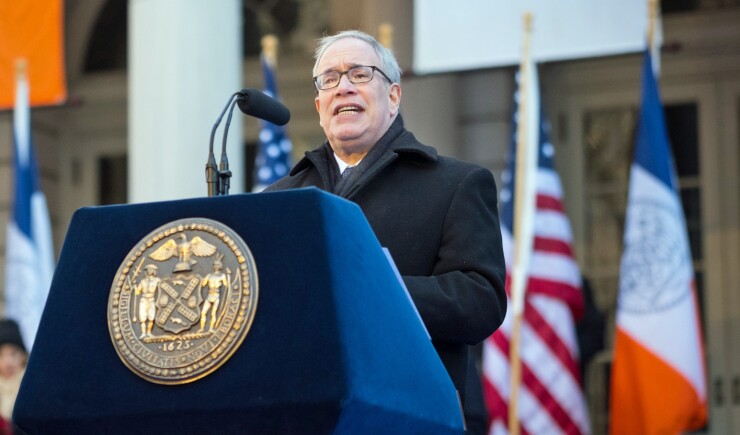Downturns in key, revenue-generating sectors could conservatively cost New York City $3.2 billion in lost tax revenues over six months, according to an analysis by city Comptroller Scott Stringer.
He cited significant projected losses in entertainment, hotel, restaurant, travel and tourism while the city is virtually closed.

Stringer is calling for the city to immediately identify potential savings, suggesting a target of 4% of city tax levy-funded agency spending with exceptions for social service agencies, Department of Health and Mental Hygiene and Health + Hospitals — adding up to roughly $1.4 billion.
Mayor Bill de Blasio ordered schools closed and said he will sign an emergency order Monday limiting restaurants, bars and cafes to food take-out and delivery. Nightclubs, movie theaters, small theater houses, and concert venues must all close under the order, which will take effect at 9 a.m. Tuesday.
In addition, governors in New York, New Jersey and Connecticut on Monday jointly announced crowd-control measures, which include the closing of movie theaters and gyms.
Stringer, a presumed mayoral candidate in 2021, said de Blasio should include the savings in his executive budget presentation due late next month if economic conditions continue to warrant action. Stringer also proposed additional city, state and federal measures to assist businesses most affected by the loss of economic activity.
“We’re facing the possibility of a prolonged recession,” Stringer said Monday. “We need to save now, before it's too late, if we’re going to weather the downturn ahead.”
Stringer based his forecast of tax-revenue losses on the following assumptions:
Hotels are projected at 20% occupancy for the rest of this fiscal year, which ends June 30, with gradual recovery through the first quarter of FY21; restaurant sales are projected to decline by 80%; and real estate and retail sales by 20% each.
“The city has a pretty robust tourist industry that’s clearly going to take a big hit,” said Howard Cure, director of municipal bond research for Evercore Wealth Management.
“The comptroller was prudent about not making assumptions about any federal stimulus here, even though it’s being contemplated,” Cure said.
“Unfortunately, the city does not have a robust rainy-day fund. I think money for things like OPEB [other post-employment benefits] going to be drained for purposes other than benefits. It’s not a lockbox.”
City voters last November approved the establishment of a rainy-day fund, although such an account has yet to materialize. For now, the city has roughly $6 billion in reserves through a series of set-asides.
Fund transfers loom as a municipal strategy nationwide to fund emergencies. In Hamden, Connecticut, for example, the Legislative Council in a series of votes over the weekend moved about $1.4 billion to pay firefighters out of its health insurance budget.
“Right now there’s a liquidity issue,” Cure said.
“There are short-term and long-term considerations. Does this break into a full-fledged recession? What does this mean? Assuming the coronavirus passes, what damage is there longer term?”
New York State faces questions, notably with its $6 billion Medicaid gap. “The state may get some relief, but I don’t know if it’s going to fill the hole,” Cure said.
Many private economic forecasters believe the possibility of a recession is rising daily and now stands at a 50% likelihood. Stringer said his office will continue to monitor economic activity and tax receipts daily and revise forecasts accordingly.
Social services agencies, including the Human Resources Administration, the Department of Homeless Services, and the Administration for Children's Services should be subject to a 2% savings target, Stringer said.
In addition, Stringer said the state should defer sales tax payments due March 20 for hotels, restaurants and small storefront retail.
He called on the city Department of Small Business Services to extend the assistance program announced last week to nonprofits, notably in arts and culture. SBS, he added, may need to expand the scope and scale of the assistance.
The city, he said, should waive all small business fines and fees starting immediately.
He also called on the federal government to include in its next emergency legislative package a small business grant program similar to one created after Sept. 11 for Lower Manhattan. Developments, he added, could prompt other measures such as deferring other tax payments.
Stringer on Sunday called on the city to provide contractual relief to social services providers and nonprofit organizations experiencing depressed client participation rates and decreased attendance due to COVID-19, experiencing difficulty paying their staff, rent, and utility bills, and realizing they will not meet the unit of service requirements established in their contracts with the city.





